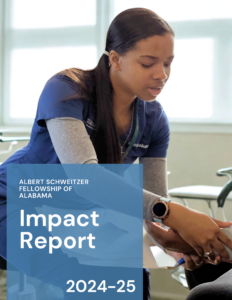By: Javacia Harris Bowser
Kim Eaton believes she’s been preparing for her new role as executive director of Albert Schweitzer Fellowship-Alabama for her entire career. For the past seven years, Kim worked as the program manager for the Graduate School and Global Affairs at the University of Alabama at Birmingham, where she focused on event planning and student engagement. Before that she worked in strategic communications at the University of Alabama. She’s also been a reporter and managing editor for a newspaper in Hawaii.
“I’ve done a little bit of everything because I love learning,” Kim says. “With all of the jobs that I’ve had I’ve gained all these different skill sets and I’m really excited to actually put them all together into one job.”
But perhaps what has prepared her most for the job is the fact that she’s a Fellow for Life. As a doctoral student in the UAB School of Public Health, Kim participated in Alabama’s Albert Schweitzer Fellowship program during the 2022-2023 academic year, working with Angel’s Hope and Children’s of Alabama to create an educational guide for families entering end-of-life care with their child.
“My experience with the fellowship was just amazing,” Kim says. “It set me up to do so much better in my PhD program and just in general, as far as learning how to be a really good leader. I wanted the chance to be able to help other students have that same experience.”
Kim has a host of new ideas she’d like to try such as grassroots fundraising and expanding the program’s community partnerships. She wants to do more on social media to promote ASF and help Fellows who are interested in pursuing a career in research get their projects published. But she says she’s going to ease into her new role and she’s approaching it with an open mind.
“I’m really excited to try some new things,” she says. “But Kristin (Boggs, ASF Alabama’s outgoing executive director) was phenomenal. I’m a little nervous because I have some really big shoes to fill.”
Also, if her experience as a Fellow taught her anything it was to never assume she knows everything.
“I’m in my late 40s and I came back to school for my PhD primarily because of life experiences,” says Kim, who lost her daughter to cancer and wanted to do something to help other families facing similar circumstances. “When you get a little bit older, you also kind of get stuck in your ways a little bit, and you think you know everything. This program really helped me see all the different needs in the community, not just of the population I wanted to work with. All of that knowledge that you’re learning throughout the year from all of the different trainings, retreats and speakers challenges you and helps you develop.”
Kim is confident that her prior work experience and her experience with ASF will make for a smooth transition as she takes up the mantle from Kristin.
“When the students found out that I was a Fellow, several of them said, ‘Oh, so you know what it’s like? You’ve been there. You know what we’re going through,’” Kim recalls. She assured them she does, indeed. She knows, for example, how often during the fellowship students must pivot.
“I said, ‘Trust me, I can’t tell you how many times my project changed because something happened,’” Kim says she told the students.
Seeing the Fellows’ projects evolve is what she says she’s looking forward to most about her new role, and what she appreciates most is the overall goal of ASF.
“The Fellowship is all about communities,” she says. “It’s about building those communities and helping them and finding out what they need, and not just assuming we know what they need. And it’s about teaching these students who are going to be potential leaders in the future going into these communities.”
Just as she’s approaching her new position with an open mind, eager to discover what the program needs most, ASF urges students to remain flexible with their projects as they uncover what’s really going on with the populations they hope to serve.
“These students are doing community assessments,” Kim says. It’s not ‘oh, we’re really smart and we know everything.’
They’re really trying to get down to the nitty gritty of what a community needs.”
ASF teaches students how to listen and pay attention to the things that matter most.
“It’s really giving students those skills that will ultimately benefit the people that they’re working with,” Kim says, “And these are really, really important skills to have.”



